MAB2035
Anti-Chondroitin 6 Sulfate Antibody, clone MK-302
ascites fluid, clone MK-302, Chemicon®
About This Item
Prodotti consigliati
Origine biologica
mouse
Livello qualitativo
Forma dell’anticorpo
ascites fluid
Tipo di anticorpo
primary antibodies
Clone
MK-302, monoclonal
Reattività contro le specie
canine, sheep, rat, rabbit, mouse, bovine, human
Produttore/marchio commerciale
Chemicon®
tecniche
ELISA: suitable
radioimmunoassay: suitable
western blot: suitable
Isotipo
IgG1
N° accesso NCBI
N° accesso UniProt
Condizioni di spedizione
dry ice
modifica post-traduzionali bersaglio
unmodified
Informazioni sul gene
human ... ACAN(176)
Specificità
Immunogeno
Applicazioni
RIA at 1:100-1:200.
Chondroitinase ABC digestion prior to antibody reaction is required for antibody reactivity. {0.5U/mL in 100mM Tris-HCL, 30 minutes room temperature} A dramatic proteolytic digestion of the core protein (e.g. with papain or pronase) significantly reduces the antibody reactivity.
Optimal working dilutions must be determined by the end user.
Stato fisico
Note legali
Non trovi il prodotto giusto?
Prova il nostro Motore di ricerca dei prodotti.
Raccomandato
Codice della classe di stoccaggio
10 - Combustible liquids
Classe di pericolosità dell'acqua (WGK)
WGK 1
Punto d’infiammabilità (°F)
Not applicable
Punto d’infiammabilità (°C)
Not applicable
Certificati d'analisi (COA)
Cerca il Certificati d'analisi (COA) digitando il numero di lotto/batch corrispondente. I numeri di lotto o di batch sono stampati sull'etichetta dei prodotti dopo la parola ‘Lotto’ o ‘Batch’.
Possiedi già questo prodotto?
I documenti relativi ai prodotti acquistati recentemente sono disponibili nell’Archivio dei documenti.
Il team dei nostri ricercatori vanta grande esperienza in tutte le aree della ricerca quali Life Science, scienza dei materiali, sintesi chimica, cromatografia, discipline analitiche, ecc..
Contatta l'Assistenza Tecnica.